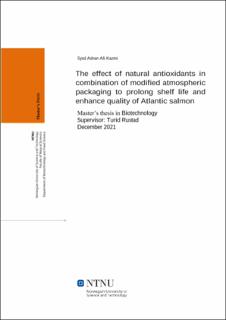| dc.contributor.advisor | Rustad, Turid | |
| dc.contributor.author | Kazmi, Syed Adnan Ali | |
| dc.date.accessioned | 2022-07-05T17:21:47Z | |
| dc.date.available | 2022-07-05T17:21:47Z | |
| dc.date.issued | 2021 | |
| dc.identifier | no.ntnu:inspera:91555634:47019145 | |
| dc.identifier.uri | https://hdl.handle.net/11250/3002899 | |
| dc.description.abstract | En økende etterspørsel for fersk oppdrettsfisk vokser frem siden fisk kan gi flere viktige næringsstoffer til menneskets kosthold, inkludert omega-3 fettsyrer. Til tross for dets høye følsomhet for biokjemisk og mikrobiell ødeleggelse, er bruken av dette produktet begrenset. I tidligere studier har modifisert atmosfære-pakning (MAP), antioksidanttilsetning og temperaturkontroll vist seg å forlenge fersk fisks holdbarhet. Denne studien var rettet mot å undersøke kombinasjonen av naturlige antioksidanter, MAP og temperaturkontroll for å forlenge holdbarheten til atlantisk laks.
Antioksidantløsning hentet fra naturlige kilder (hellig basilikum, Ocimum sanctum) ble tilberedt for å bruke dem i pakkingsmetoder for laks. Studien ble utført i to lagringseksperimentoppsett som varte i 16 dager. Det første lagringsforsøket ble kombinert med MAP-emballasje (CO2:N2 60:40) hvor en prøve ble behandlet med antioksidant og en annen uten antioksidant. Flere kvalitetsendringer under lagring er analysert, inkludert drypptap, mikrobiell vekst og måling av primære og sekundære oksidasjonsprodukter med PV. Det andre eksperimentoppsettet av eksperimentet ble utført ved bruk av vakuumpakkingsmetode mens en prøve ble behandlet med antioksidant og en annen uten. Samme analysemetoder ble brukt for å bestemme kvalitetsendringene under lagring.
Prøver behandlet med hellig basilikum (Ocimum sanctum) i kombinasjon med MAP-emballasje viste signifikant økt holdbarhet sammenlignet med de øvrige metodene som ble brukt. Derimot var prøven behandlet med hellig basilikum i kombinasjon med vakuumemballasje som en annen signifikant metode der økt holdbarhet ble bevist etter MAP med antioksidantemballasje. Alle andre prøver som ikke ble behandlet med noen antioksidant viste mindre motstand mot økt holdbarhet til tross for bruk av MAP og vakuumemballasje. Det var en forskjell mellom resultatene oppnådd fra MAP-emballasje og vakuumpakning, da MAP viste noe bedre resultater mot forlengelsen av holdbarheten.
Avslutningsvis viser resultatene fra denne studien at temperaturen påvirker mikrobiotaveksten på atlantisk laks, og at MAP holder kvaliteten. Verken lipidoksidasjon eller drypptap ble påvirket av antioksidantbehandling. | |
| dc.description.abstract | A growing market for fresh aquaculture fish is emerging since fish can provide several important nutrients to the human diet, including omega-3 fatty acids. Despite its high susceptibility to biochemical and microbial spoilage, the use of this product is limited. In earlier studies, modified atmosphere packaging (MAP), antioxidant addition and temperature control have been shown to extend fresh fish's shelf life. This study was aimed at investigating the combination of natural antioxidants, MAP and temperature control to prolong the shelf life of Atlantic salmon.
Antioxidant solution obtained from natural sources (Holy basil, Ocimum sanctum) were prepared to use them in packaging methods for salmon. The study was conducted in two storage experiment setups lasting for 16 days. The first storage experiment was combined with MAP packaging (CO2:N2 60:40) in which one sample was treated with antioxidant and other without antioxidant. Several quality changes during storage have been analyzed, including drip loss, microbial growth, and measurement of primary and secondary oxidation products by PV. The second experiment setup for experiment was performed using vacuum packaging method while treating one sample with antioxidant and other without it. Same analyzing methods were used to determine the quality changes during storage.
Samples treated with Holy basil (Ocimum sanctum ) in combination with MAP packaging showed lower microbial growth activity as compared to the other methods used. On the other hand, the sample treated with holy basil in combination of vacuum packaging was the second significant method which helped to slow down microbial growth after MAP with antioxidant packaging. All other samples which were not treated with any antioxidant showed less resistance towards increase of shelf life despite using the MAP and vacuum packaging. There was a difference between the results obtained from MAP packaging and vacuum packaging as MAP showed little bit better results towards slowing down the microbial growth.
In conclusion, the results of this study demonstrate that temperature affects microbiota growth on Atlantic salmon, and that MAP keeps the quality. Neither lipid oxidation nor drip loss was affected by antioxidant treatment. | |
| dc.language | eng | |
| dc.publisher | NTNU | |
| dc.title | The effect of natural antioxidants in combination of modified atmospheric packaging to prolong shelf life and enhance quality of Atlantic salmon. | |
| dc.type | Master thesis | |
